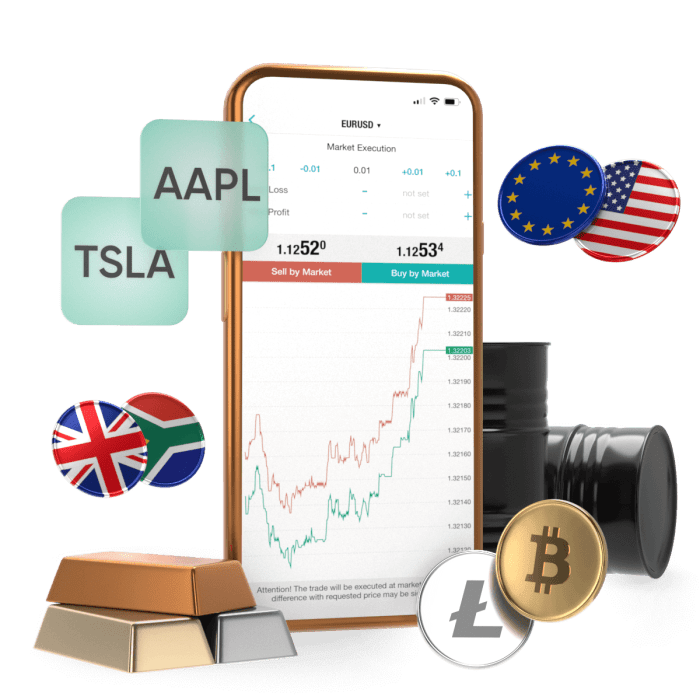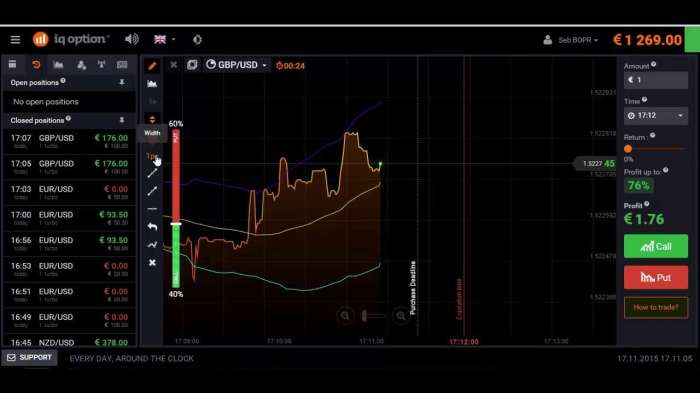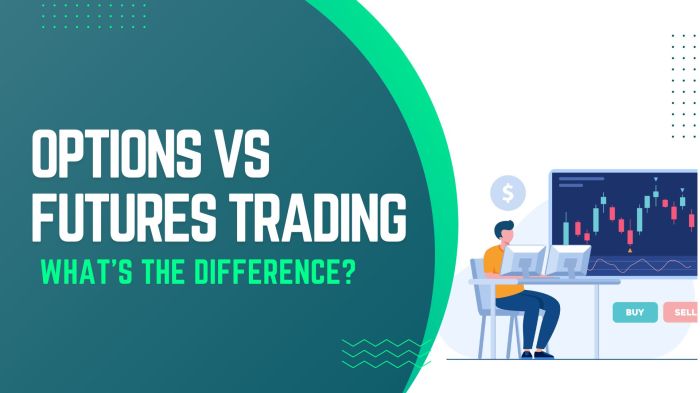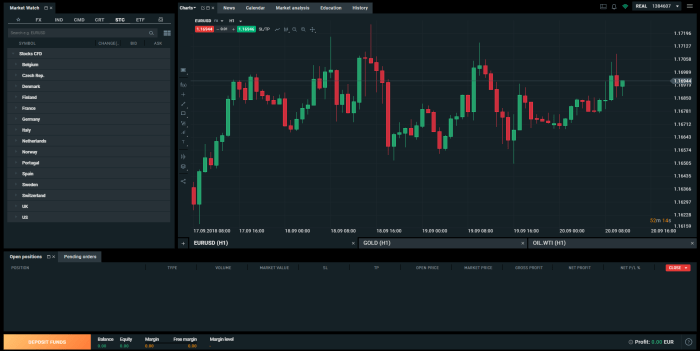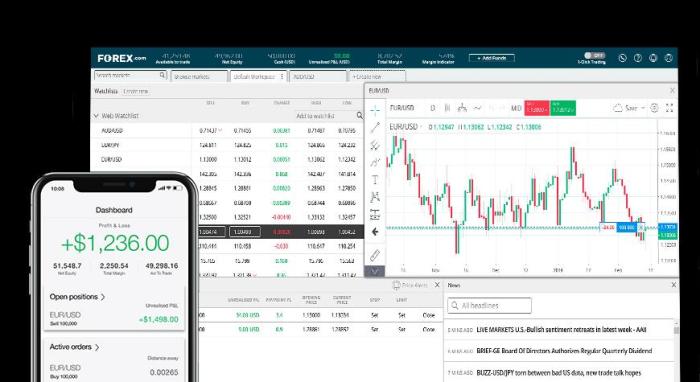
Forex social trading: It’s the buzzword everyone’s whispering about, a blend of community, strategy, and the thrill of the forex market. Think of it as crowdsourcing your investment decisions, leveraging the collective wisdom (and sometimes, the collective mistakes!) of other traders. But is it all sunshine and rainbows, or are there hidden reefs lurking beneath the surface? Let’s dive in and navigate this exciting, yet potentially risky, world.
This guide breaks down the mechanics of forex social trading, from understanding the different platform types and weighing the pros and cons to mastering risk management and spotting potential scams. We’ll explore proven strategies, analyze signals, and discuss the importance of community engagement – because let’s face it, social trading is as much about people as it is about profits. We’ll also examine the legal landscape and future trends shaping this dynamic space, helping you make informed decisions and, hopefully, ride the wave to success.
Defining Forex Social Trading
Forex social trading is essentially crowdsourcing the wisdom of the markets. It allows traders to follow the strategies of experienced forex traders, mirroring their trades automatically, or learning from their insights and decisions. This eliminates the need for extensive individual market research and analysis, making forex trading accessible to a broader audience. The mechanics involve connecting your trading account to a social trading platform, selecting a trader or strategy to follow, and then automatically copying their trades (or adapting them to your own risk tolerance).
Forex social trading platforms function as online marketplaces connecting followers and traders. They offer a variety of features, including performance statistics, risk management tools, and communication channels between traders and followers. The success of social trading hinges on the ability to identify consistently profitable traders and to manage the inherent risks associated with mimicking their trades.
Types of Forex Social Trading Platforms
Social trading platforms vary in their features and offerings. Some focus primarily on copy trading, where followers automatically replicate the trades of selected traders. Others offer a more community-driven approach, allowing for interaction, education, and the sharing of trading strategies and ideas. Some platforms are integrated directly with forex brokers, while others operate independently. A key differentiator is the level of transparency offered regarding trader performance and risk management.
Advantages and Disadvantages of Forex Social Trading
The advantages of forex social trading include reduced research time, access to expert strategies, and diversified risk through following multiple traders. However, disadvantages exist, including potential losses from following unsuccessful traders, lack of control over individual trades, and the risk of platform-specific limitations or biases in the presented data. Choosing a reputable platform and carefully assessing trader performance are crucial for mitigating these risks.
Examples of Successful and Unsuccessful Forex Social Trading Strategies
A successful strategy might involve a trader consistently employing a well-defined, low-risk strategy, such as scalping or swing trading, and transparently sharing their methodology. Their success would be demonstrated by consistent positive returns over an extended period, with a low maximum drawdown. Conversely, an unsuccessful strategy might involve a trader using high-leverage trades, making unpredictable decisions, or lacking transparency in their approach. Such a strategy would likely show erratic returns, significant drawdowns, and potentially substantial losses for followers. Analyzing a trader’s historical performance metrics, including win rate, average trade duration, and maximum drawdown, is vital in assessing their strategy’s success. It’s important to remember that past performance is not necessarily indicative of future results.
Risks and Rewards of Forex Social Trading
Forex social trading offers the alluring prospect of leveraging the expertise of seasoned traders, potentially boosting your returns. However, like any investment, it comes with its own set of risks. Understanding these risks and implementing effective risk management strategies is crucial for navigating the forex social trading landscape successfully. Let’s delve into the potential pitfalls and the rewards that can be reaped.
Financial Risks Associated with Forex Social Trading
The inherent volatility of the forex market significantly amplifies the risks associated with social trading. Following a seemingly successful trader doesn’t guarantee your own success. Several factors can lead to financial losses. For instance, a trader’s past performance is not necessarily indicative of future results. Market conditions change constantly, and a strategy that worked wonders yesterday might fail today. Furthermore, the platform fees, commission charges, and potential losses from copied trades can quickly erode your capital. There’s also the risk of choosing an unreliable provider or a fraudulent signal provider, leading to substantial financial losses.
Psychological Factors Influencing Forex Social Trading Outcomes
The emotional rollercoaster of forex trading is intensified in a social trading environment. The pressure to conform to the crowd, fear of missing out (FOMO), and the tendency to chase quick wins can lead to impulsive decisions and poor risk management. For example, witnessing significant gains from a copied trade might tempt you to increase your investment without considering the potential risks. Conversely, experiencing consecutive losses can trigger emotional reactions, such as panic selling, leading to further losses. The constant stream of information and the social aspect can also create emotional stress and impair rational decision-making.
Importance of Risk Management in Forex Social Trading
Effective risk management is paramount in forex social trading. Without it, even the most successful traders can experience significant losses. This involves carefully evaluating your risk tolerance, diversifying your investments across multiple traders and strategies, and setting stop-loss orders to limit potential losses on individual trades. Regularly monitoring your portfolio and adapting your strategy based on market conditions is also crucial. For example, a well-defined risk management plan might involve allocating only a small percentage of your capital to each copied trade, ensuring that a single losing trade won’t wipe out your entire investment.
Strategies for Mitigating Risks in Forex Social Trading
Several strategies can help mitigate the risks associated with forex social trading. Thoroughly researching and vetting the traders you choose to follow is critical. Look for traders with a proven track record, consistent profitability, and a well-defined trading strategy. Diversifying your portfolio across multiple traders and strategies reduces the impact of a single trader’s poor performance. Setting realistic expectations and avoiding impulsive decisions based on emotions is crucial. Regularly reviewing and adjusting your strategy based on performance and market conditions will further enhance your risk management. Finally, seeking advice from a qualified financial advisor can provide valuable insights and guidance.
Choosing a Forex Social Trading Platform
Navigating the world of forex social trading can feel like stepping into a bustling marketplace. With numerous platforms vying for your attention, selecting the right one is crucial for a successful and secure trading experience. Understanding the key features, fee structures, and user experiences is paramount before committing your capital.
Choosing the right forex social trading platform involves careful consideration of several factors. A platform that suits one trader might not be ideal for another, depending on their experience level, trading style, and risk tolerance.
Forex Social Trading Platform Comparison
A comprehensive comparison helps illuminate the strengths and weaknesses of different platforms. This allows you to make an informed decision based on your specific needs.
| Platform Name | Key Features | Fee Structure | User Ratings (Average) |
|---|---|---|---|
| eToro | Copy Trading, Social Feeds, Educational Resources, Wide Range of Assets | Spreads, Commission on some assets, Inactivity fees may apply. | 4.2/5 |
| ZuluTrade | Automated Trading, Signal Providers, Portfolio Management Tools, Risk Management Features | Subscription fees, Performance-based fees, spreads | 3.8/5 |
| Myfxbook | Autotrade, Signal Providers, Community Forums, Backtesting Capabilities | Free basic account, paid premium features | 4.0/5 |
| DupliTrade | Copy Trading, Strategy Selection Tools, Risk Management, Mobile App | Commission-based, spreads vary | 3.9/5 |
| Tradency | Signal Providers, Automated Trading, Customizable Portfolios, Advanced Analytics | Subscription fees, performance-based fees | 3.7/5 |
*Note: User ratings are approximate averages based on various online reviews and may vary over time.*
Evaluating Platform Credibility and Security
Before entrusting your funds to any platform, a thorough security assessment is essential. This checklist helps ensure you’re choosing a reputable and secure forex social trading environment.
- Regulation and Licensing: Verify if the platform is regulated by a reputable financial authority (e.g., FCA, ASIC, CySEC).
- Security Measures: Check for encryption protocols (SSL/TLS), two-factor authentication, and other security features to protect your account and funds.
- Transparency and Disclosure: Ensure the platform provides clear information about its fees, risks, and trading conditions.
- Customer Support: Evaluate the responsiveness and helpfulness of their customer support channels (email, phone, live chat).
- Reputation and Reviews: Research online reviews and testimonials from other users to gauge the platform’s reputation and reliability.
- Data Privacy Policy: Review their privacy policy to understand how your personal and financial data is handled.
Factors to Consider When Selecting a Platform
Individual trading goals and risk tolerance significantly influence platform selection. Consider these factors to find the perfect fit.
- Trading Goals: Define your objectives (e.g., passive income, active trading, long-term growth).
- Risk Tolerance: Assess your comfort level with potential losses and choose a platform with appropriate risk management tools.
- Trading Style: Determine your preferred trading approach (e.g., scalping, swing trading, day trading) and select a platform that aligns with it.
- Available Assets: Check the range of assets offered (forex pairs, stocks, cryptocurrencies, etc.).
- User Interface and Experience: A user-friendly platform simplifies the trading process and enhances the overall experience.
- Educational Resources: Access to educational materials and learning tools can significantly improve your trading skills.
- Fees and Commissions: Compare the fee structures of different platforms to identify the most cost-effective option.
Analyzing Social Trading Signals and Strategies
Navigating the world of forex social trading requires a keen eye for detail and a healthy dose of skepticism. Understanding how to analyze signals and strategies is crucial to maximizing your potential for profit while minimizing risk. This section will equip you with the tools to decipher the information provided by various platforms and providers, enabling you to make informed decisions about which strategies to follow.
Interpreting and Evaluating Forex Social Trading Signals
Forex social trading signals, essentially recommendations on whether to buy or sell a specific currency pair at a particular price, come in various forms. Some platforms provide concise signals including entry and exit points, stop-loss and take-profit levels, while others offer more detailed analyses including charts, indicators, and fundamental reasoning. Effective evaluation involves considering the signal provider’s track record, their trading style, and the consistency of their signals. A provider with a consistently high win rate and a clear trading strategy is generally more trustworthy than one with erratic performance. For example, consider two providers: Provider A consistently achieves a 60% win rate over a year, while Provider B boasts a 75% win rate in one month but only 40% over the past year. Provider A’s consistent performance, even if lower, suggests a more reliable strategy.
Examples of Social Trading Strategies
Copy trading and mirror trading are the most prevalent social trading strategies. Copy trading involves automatically replicating the trades of a chosen trader, while mirror trading mirrors the exact positions and sizes of the chosen trader’s portfolio. Consider a scenario where a successful trader consistently profits from swing trading major currency pairs. A copy trader could benefit from automatically executing the same trades, scaling their investment based on their own capital. Conversely, a novice trader might find mirror trading less manageable due to the potentially high frequency of trades and larger capital requirements.
Comparing Performance of Different Social Trading Strategies
Hypothetical scenarios can illuminate the differences in performance. Let’s imagine two traders, Trader X using copy trading and Trader Y using mirror trading, both following the same experienced trader. If the experienced trader makes 10 trades, with 7 profitable and 3 losing, Trader X, employing copy trading, might adjust their position sizes based on risk tolerance, potentially reducing losses on unprofitable trades. Trader Y, however, would experience the same percentage of wins and losses but with potentially amplified returns and losses due to the exact mirroring of positions. This highlights that while both strategies follow the same trader, the risk and reward profiles can differ significantly.
Identifying and Avoiding Fraudulent or Misleading Signals
The forex market unfortunately attracts fraudulent actors. Beware of providers promising unrealistic returns or guaranteeing profits. Always verify the provider’s track record independently, checking for consistent profitability over extended periods and avoiding those with suspiciously high win rates. Transparency is key; a reputable provider will openly share their trading history and methodology. Additionally, be wary of signals that lack clear entry and exit points or those relying solely on vague or unsubstantiated claims. Remember, consistently high returns are rare and often a red flag.
Community and Social Aspects of Forex Social Trading

Forex social trading isn’t just about copying signals; it’s about tapping into a vibrant community of traders, sharing knowledge, and learning from collective experiences. The social aspect significantly influences success, offering both incredible opportunities and potential pitfalls. Understanding this dynamic is crucial for navigating the world of social trading effectively.
The Role of Community Engagement and Interaction
Active participation within a forex social trading community can dramatically boost your trading performance. Engaging in discussions, sharing insights, and learning from others’ successes and failures creates a collaborative learning environment. This shared experience allows traders to refine their strategies, identify potential risks earlier, and gain a broader perspective on market trends. For instance, a trader might learn about a new indicator or trading technique through community discussions, thereby enhancing their trading toolkit. The constant exchange of ideas and feedback fosters a more informed and adaptable trading approach.
Communication and Collaboration Among Social Traders
Effective communication is the bedrock of a successful social trading community. Open dialogue, respectful debate, and a willingness to share both wins and losses build trust and encourage collaboration. Traders can collectively analyze market situations, brainstorm strategies, and provide support during periods of market volatility. Imagine a scenario where several traders are discussing a particular currency pair; through collaboration, they might identify a potential trading opportunity that an individual trader might have missed. This collective intelligence offers a significant advantage. The collaborative spirit fosters a sense of community, encouraging mutual learning and growth.
Benefits and Drawbacks of Following Popular Traders
Following successful traders can seem like a shortcut to profitability, but it’s crucial to approach this with caution. While observing the strategies of experienced traders can offer valuable learning opportunities, blindly copying their trades without understanding the underlying rationale is risky. The benefits lie in learning their approach to risk management, their entry and exit strategies, and their overall trading philosophy. However, the drawbacks include the potential for significant losses if the popular trader’s strategy falters or if market conditions change unexpectedly. A trader’s past performance is not indicative of future results, and relying solely on a single trader’s signals can be highly detrimental. Diversification across multiple traders and strategies is always recommended.
Building a Positive and Productive Social Trading Community
Cultivating a positive and productive social trading community requires fostering an environment of respect, transparency, and constructive criticism. This involves establishing clear guidelines for communication, encouraging respectful disagreement, and promoting a culture of continuous learning. Moderation plays a key role in ensuring that discussions remain focused and productive, preventing the spread of misinformation or harmful trading practices. Regular community events, such as webinars or Q&A sessions with experienced traders, can further enhance engagement and knowledge sharing. A strong community fosters a sense of belonging and support, making the often-challenging world of forex trading a more collaborative and less isolating experience.
Legal and Regulatory Considerations

Navigating the world of forex social trading requires a keen understanding of the legal landscape. The rules governing this activity vary significantly across jurisdictions, impacting both the providers of social trading platforms and the users who participate. Ignoring these legal nuances can lead to significant financial and legal repercussions.
The legal and regulatory frameworks governing forex social trading are complex and differ substantially depending on the location of both the platform provider and the trader. Some regions have robust regulatory bodies specifically overseeing online trading activities, while others have less developed frameworks or none at all. This lack of uniformity creates a challenging environment, requiring traders to carefully research the applicable laws in their region and the region where the platform is based.
Jurisdictional Differences in Forex Social Trading Regulation
Forex social trading falls under various existing regulations, often encompassing securities laws, investment advice regulations, and anti-money laundering (AML) and know-your-customer (KYC) rules. In highly regulated markets like the UK (Financial Conduct Authority or FCA), Australia (Australian Securities and Investments Commission or ASIC), and the European Union (ESMA), platforms must meet stringent requirements concerning licensing, client protection, and transparency. Conversely, less regulated regions may offer fewer safeguards for traders, increasing the risk of fraud and scams. For instance, the regulatory landscape in Cyprus (CySEC) is quite different from that of the US (SEC and CFTC), necessitating different levels of due diligence from traders.
Importance of Understanding Legal Implications
Understanding the legal implications of using forex social trading platforms is paramount for both providers and users. For users, it means being aware of the risks involved, including the possibility of losing capital, and understanding their rights and responsibilities. This includes understanding the terms and conditions of the platform, the nature of the signals being followed, and the potential for conflicts of interest. For providers, it means adhering to all applicable regulations, ensuring transparency in their operations, and protecting user data. Failure to do so can result in hefty fines, legal action, and reputational damage.
Responsibilities of Social Trading Providers and Users
Social trading platforms have a responsibility to operate transparently, maintain robust security measures to protect user data, and accurately represent the risks associated with social trading. They are also responsible for complying with all applicable KYC/AML regulations and ensuring that their signals providers are properly vetted. Users, on the other hand, are responsible for conducting their own due diligence, understanding the risks involved, and only investing funds they can afford to lose. They should also be aware of the legal ramifications of following signals without independent verification and analysis.
Examples of Potential Legal Issues
Potential legal issues in forex social trading can include unauthorized trading, misrepresentation of trading performance, breach of contract, and violations of data protection laws. For example, a platform might face legal action for failing to disclose conflicts of interest, while a user could face legal consequences for engaging in insider trading based on information obtained through the platform. Furthermore, platforms could be held liable for losses incurred by users due to negligence or fraudulent activities on the platform. Another example involves a signal provider falsely advertising their success rate, leading to legal action from misled users. The complexities of cross-border transactions and varying legal interpretations further amplify the potential for disputes.
Future Trends in Forex Social Trading

Forex social trading, still relatively young, is poised for explosive growth, driven by technological leaps and evolving regulatory landscapes. The coming years will see a dramatic shift in how traders connect, learn, and invest, fundamentally altering the forex market’s dynamics.
The convergence of technology and finance is reshaping the forex social trading landscape. Increased accessibility, enhanced analytical tools, and sophisticated algorithms are set to redefine the experience for both novice and experienced traders.
Technological Advancements’ Impact on Forex Social Trading
Technological advancements are set to revolutionize forex social trading. Faster internet speeds and improved mobile interfaces will make participation more seamless and accessible globally. The rise of sophisticated trading platforms incorporating advanced charting tools, real-time market data feeds, and personalized dashboards will empower traders with more informed decision-making capabilities. Imagine a platform that not only provides signals but also uses AI to analyze a trader’s risk profile and suggest optimal signal providers based on their individual trading style. This level of personalization is only possible with the current and future development of technology. Furthermore, the integration of blockchain technology offers potential for increased transparency and security in transactions and signal verification.
The Role of Artificial Intelligence and Machine Learning in Social Trading
Artificial intelligence (AI) and machine learning (ML) are poised to play a pivotal role in the future of forex social trading. AI-powered algorithms can analyze vast datasets of market data, trader performance, and social signals to identify patterns and predict market movements with greater accuracy than traditional methods. This could lead to the development of more sophisticated and reliable trading signals, reducing risk and increasing profitability for followers. Imagine an AI that can predict which signals are most likely to be successful based on past performance, economic indicators, and even news sentiment. This level of analysis is beyond human capability alone. Moreover, ML can personalize the social trading experience by recommending suitable signal providers and strategies based on individual trader profiles and risk tolerance.
Increased Regulation and Oversight of Forex Social Trading
As forex social trading gains popularity, the need for increased regulation and oversight becomes increasingly critical. Regulatory bodies are likely to implement stricter guidelines regarding transparency, risk disclosure, and the protection of investors. This will involve more stringent checks on signal providers, ensuring their qualifications and preventing fraudulent activities. For instance, we might see a system similar to the regulation of financial advisors, requiring signal providers to meet certain criteria and be licensed. This enhanced regulatory framework will foster a more trustworthy and sustainable social trading ecosystem, encouraging participation and protecting investors from scams.
Predictions for the Future of Forex Social Trading and its Broader Impact on Financial Markets
The future of forex social trading points towards a more democratized and accessible financial market. The integration of AI and ML will lead to more sophisticated trading strategies and improved risk management tools. We predict a rise in hybrid models, combining algorithmic trading with human expertise and social signals. The increased regulation will promote greater trust and transparency, attracting a wider range of investors. This could lead to a significant shift in market dynamics, potentially impacting price volatility and liquidity. For example, the increased participation of retail investors through social trading platforms could lead to greater market depth and reduced price manipulation by large institutional players. The overall impact on the broader financial markets is likely to be significant, fostering increased participation and potentially influencing market trends.
Closing Summary: Forex Social Trading
Forex social trading offers a unique blend of collaboration and risk. While the potential for profit is enticing, the inherent volatility of the forex market and the reliance on others’ strategies demand careful consideration. By understanding the mechanics, mitigating risks, and choosing a reputable platform, you can increase your chances of navigating this complex world successfully. Remember, due diligence, a well-defined strategy, and a healthy dose of skepticism are your best allies in this exciting, yet unpredictable, journey.
You also can understand valuable knowledge by exploring live forex trading graphs.
You also can understand valuable knowledge by exploring forex trading seminars near me.
